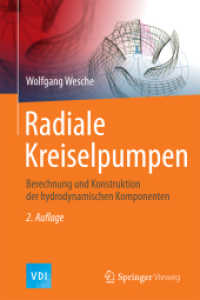- ホーム
- > 洋書
- > 英文書
- > Psychology
Full Description
What does it mean to be human? Why do people dehumanize others (and sometimes themselves)? These questions have only recently begun to be investigated in earnest within psychology. This volume presents the latest thinking about these and related questions from research leaders in the field of humanness and dehumanization in social psychology and related disciplines. Contributions provide new insights into the history of dehumanization, its different types, and new theories are proposed for when and why dehumanization occurs. While people's views about what humanness is, and who has it, have long been known as important in understanding ethnic conflict, contributors demonstrate its relevance in other domains, including medical practice, policing, gender relations, and our relationship with the natural environment. Cultural differences and similarities in beliefs about humanness are explored, along with strategies to overcome dehumanization.
In highlighting emerging ideas and theoretical perspectives, describing current theoretical issues and controversies and ways to resolve them, and in extending research to new areas, this volume will influence research on humanness and dehumanization for many years.
Contents
Advances in Understanding Humanness and Dehumanization, P.G. Bain, J. Vaes, J.-P. Leyens. Part 1: Historical and Theoretical Insights into Dehumanization. An Anthropological History of Dehumanization from Late 18th to Mid-20th Centuries, G. Jahoda. What Is Dehumanization?, N. Haslam. The Lesser Minds Problem, A. Waytz, J. Schroeder, N. Epley. Dehumanized Perception: Psychological and Neural Mechanisms Underlying Everyday Dehumanization, V. Lee, L. Harris. (Over)Valuing "Humanness" as an Aggravator of Intergroup Prejudices and Discrimination, G. Hodson, C.C. Macinnis, K. Costello. Dehumanization: A Threat and Solution to Terror Management, N. Heflick, J. Goldenberg. Part 2: Dehumanization - Specific Targets and Fields of Occurrence. Dehumanization, Moral Disengagement and Public Attitudes to Crime and Punishment, M. Vasiljevic, G.T. Viki. Cops and Criminals: The Interplay of Mechanistic and Animalistic Dehumanization in the Criminal Justice System, R. Hetey, J. Eberhardt. Humanity Forever in Medical Dehumanization, J.-P. Leyens. The Inhuman Body: When Sexual Objectification Becomes Dehumanizing, J. Vaes, S. Loughnan, E. Puvia. An Interpersonal Perspective on Dehumanization, B. Bastian, J. Jetten, N. Haslam. Part 3: Exploring and Extending Ideas About Humanity. The Human Category: Its Structure, Its Content, and Its Implications, P.G. Bain. Dehumanization as a Denial of Human Potentials: The Naïve Theory of Humanity Perspective, M. Kofta, T. Baran, M. Tarnowska. More Human: Individuation in the 21st Century, J. Swencionis, S. Fiske. On Human-Nature Relationships, Y. Kashima, E. Margetts. Conclusion. Understanding Humanness and Dehumanization: Emerging Themes and Directions, J. Vaes, P.G. Bain, J.-P. Leyens.






